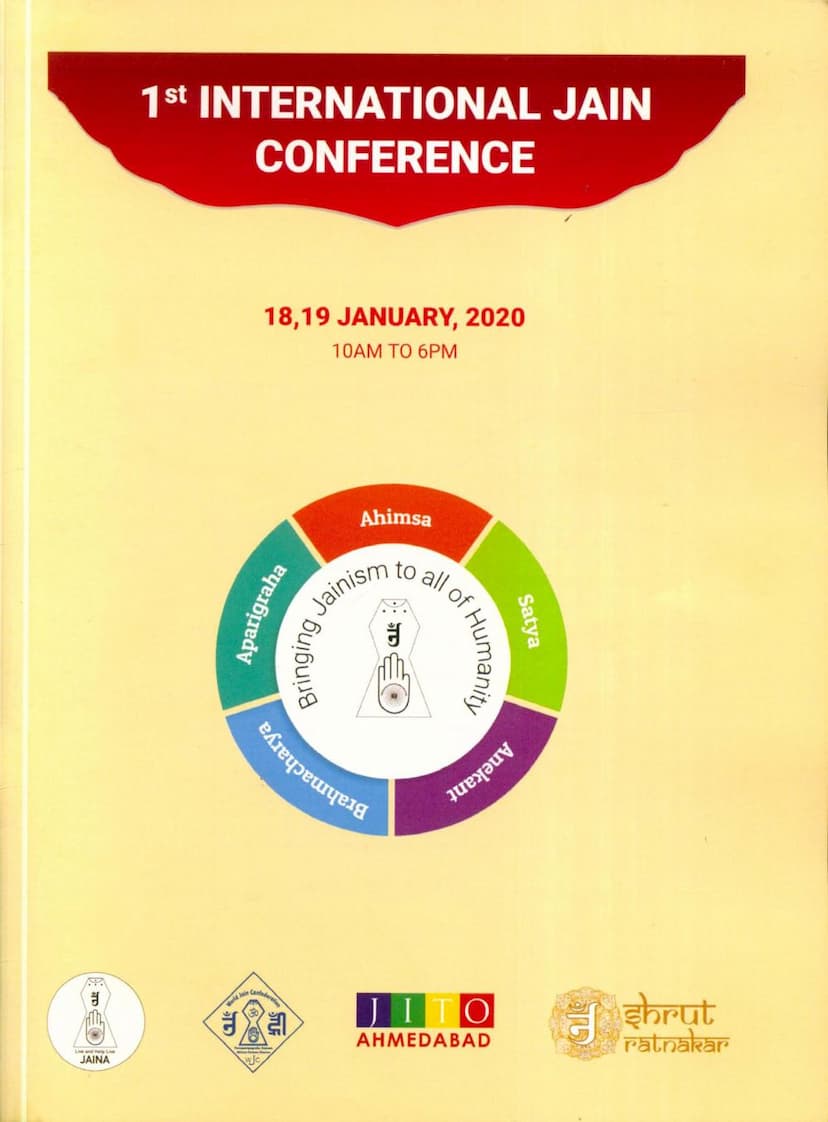1st Jain International Conference
Added to library: September 1, 2025

Summary
Here's a comprehensive summary of the provided Jain text, focusing on the content of the "1st International Jain Conference" proceedings:
Overall Purpose:
The "1st International Jain Conference," held on January 18th and 19th, 2020, in Ahmedabad, India, was a significant event organized by JAINA (Federation of Jain Associations in North America), the World Jain Confederation (WJC), JITO (Jain International Trade Organization), and Shrut Ratnakar. The overarching theme was "Bringing Jainism to all of Humanity," aiming to highlight the timeless relevance of Jain principles for contemporary challenges and to promote their adoption globally for peace, welfare, and spiritual upliftment.
Key Themes and Discussions:
The conference brought together scholars, spiritual leaders, and community representatives to discuss and disseminate Jain philosophy and practices. Several core Jain tenets were central to the discussions:
- Ahimsa (Non-violence): Emphasized as a cornerstone of Jainism, with discussions on its practical application not just in personal life but also in addressing global issues like environmental degradation and conflict. The need to celebrate International Non-violence Day on October 2nd was highlighted, with a call for action plans.
- Aparigraha (Non-possession/Non-attachment): Presented as a crucial principle for curbing excessive consumerism and greed, promoting contentment, and addressing resource exploitation. This was seen as vital for environmental sustainability and a happy life.
- Anekantavada (Non-absolutism/Multiplicity of viewpoints): Highlighted as a means to foster tolerance, respect for diverse opinions, and reduce conflict. It encourages understanding that truth can have multiple facets.
Key Initiatives and Program Highlights:
The conference featured several important launches and presentations:
- Jain Lexicon: A new web portal intended to be an online resource, starting as a dictionary and evolving into an encyclopedia of Jain Dharma.
- Book Releases: The conference saw the release of updated editions of significant Jain works, including "Agyan Timir Bhaskar" and the first comprehensive Verb-Dictionary of the Gujarati language.
- Cultural Presentations: A one-act play titled "Pahinidevi," depicting the sacrifice of a mother who gave her son to Jainism, was a notable highlight.
- Scholarly Sessions: Numerous sessions with leading Jain scholars from India and abroad explored various aspects of Jainism, including:
- The importance of Jain scholars in the modern world.
- The practice of compassion.
- The contemporary relevance of Jainism for human culture and society.
- The utility of Bhagwan Mahavir's principles.
- The role of technology in bridging the gap between Jain philosophy and seekers.
- Translating the high-impact potential of Jainism into global practice.
- Leshya (coloring of the soul) as a technique for healing and biochemical alteration.
- The role of women in the global utility of Jain dharma-darshan.
- Jainism for the betterment of social life.
- The relevance of Jain traditions and principles in current education.
Organizational Backing and Support:
The conference was a collaborative effort of prominent Jain organizations, showcasing their commitment to spreading Jainism:
- JAINA: Representing Jain centers in North America, it aims to promote religious and educational activities of Jain Dharma.
- World Jain Confederation (WJC): Focused on adopting Jain tenets for world peace and environmental conservation.
- JITO (Jain International Trade Organization): A global body of Jain businessmen and professionals promoting ethical business practices and community welfare.
- Shrut Ratnakar: An institute dedicated to collecting, editing, translating, and printing rare Jain books, and organizing workshops to deepen understanding of Jain subjects.
Messages of Support:
The conference received warm messages of support from prominent figures, including:
- Acharya Devvrat (Governor of Gujarat): Emphasized the relevance of Jain principles for humanity and world peace.
- Vijay Rupani (Chief Minister of Gujarat): Highlighted the role of Jainism in economic empowerment and promoting world peace through its core tenets.
- Bhupendrasinh Chudasma (Minister, Gujarat State): Expressed joy at the initiative to spread Jain heritage and principles globally.
- Amit Shah (Former Mayor, Ahmedabad): Acknowledged the conference's commendable work in informing humanity about Jainism's rich heritage.
- Acharya Padmasagar Suri: Stressed the need for Jainism to be widely recognized globally, referencing the legacy of Virchand Raghavji Gandhi and the challenges and opportunities facing the Jain community.
Keynote Speakers:
The conference featured keynote addresses from:
- Vallabhbhai Bhansali: A prominent investment banker and capital markets expert, who spoke on topics beyond finance, including religion and behavioral sciences.
- Shailendra Raj Mehta: An economist specializing in various fields, and President and Director of MICA, a leading management school.
Scholarly Contributions and Their Essence:
The listed scholars and their topics underscore the diverse applications of Jain philosophy:
- Surendra Pokharna: Advocated for celebrating International Non-violence Day globally with an action plan to address environmental and social violence.
- Dr. Sejal Shah: Explored the role of education and spirituality in fostering humane behavior, with Jainism offering a foundation for value education.
- Dr. Lata Bothra: Discussed the enduring relevance of Bhagwan Mahavir's principles for various aspects of life, from personal development to governance.
- Rahul Kapoor Jain: Presented "Leshya" as a key concept for personal transformation, well-being, and spiritual awakening.
- Narendra Bhandari: Argued for translating Jainism's high-impact potential into global practice through scientific research and presenting its universal laws and principles to a global audience.
- Prof. Dharmchand Jain: Detailed how Jain principles contribute to the betterment of social life by promoting ethical behavior, compassion, and mutual cooperation.
- Dr. Sweta Jain: Highlighted the significant role of women in imbibing and propagating Jain principles, thereby contributing to the welfare of humanity and the world.
- Prof. Ashok Kumar Singh: Focused on the relevance and application of Jain tradition and principles in contemporary education.
- Prof. G.C. Tripathi: Emphasized the critical need for Ahimsa, Aparigraha, and Anekantavada in addressing contemporary global challenges like conflict, exploitation, and lack of tolerance.
In essence, the 1st International Jain Conference was a multifaceted event dedicated to showcasing the profound and practical wisdom of Jainism, encouraging its adoption for the betterment of individuals, society, and the planet. It underscored the belief that Jain principles offer solutions to many of the world's most pressing issues.